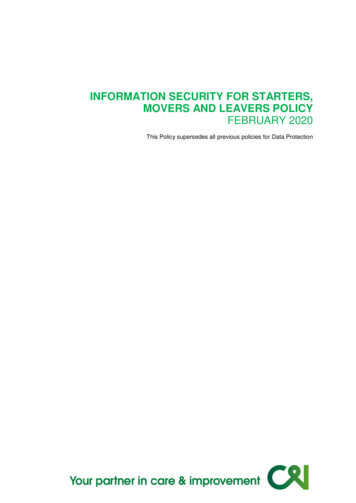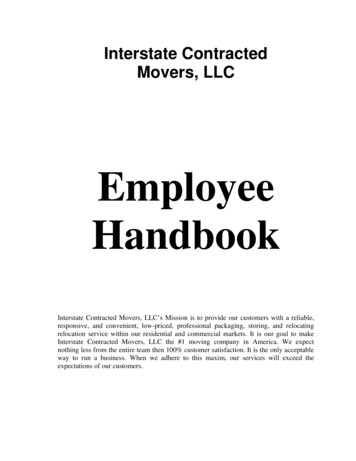
Transcription
INFORMATION SECURITY FOR STARTERS,MOVERS AND LEAVERS POLICYFEBRUARY 2020This Policy supersedes all previous policies for Data Protection
Policy titleInformation Security for Starters, Movers and Leavers PolicyPolicyreferencePolicy categoryCOR73Relevant toAll StaffDate publishedFebruary 2020ImplementationdateDate lastreviewedNext reviewdatePolicy leadCorporate PoliciesFebruary 2023Mahwish Noor, Information Governance ManagerContact detailsEmail: rJeffrey Boateng, Director of Clinical Information ManagementSally Quinn, Director of HR and ODApproved by(Group):Information Governance Steering GroupApproved by(Committee):DocumenthistoryMembership ofthe Policydevelopment/review teamTelephone: 020 3317 7100Audit and Risk ormation Governance ManagerConsultationMembers of the Information Governance Steering GroupSummary1. The Trust’s Policy on boarding and off boarding Employees, and how this alsoapplies to Employees moving internally within the Trust.2. How the Trust ensures that information management is not disrupted at anypoint during the Employee lifecycle.3. To ensure that starters, movers and leavers understand their collectiveresponsibilities towards safeguarding the Trust’s Information Assets.DO NOT AMEND THIS DOCUMENTFurther copies of this document can be found on the Foundation Trust Intranet.2
SUMMARY:INFORMATION SECURITY FOR STARTERS, MOVERS AND LEAVERSPOLICYPurpose of this policyThis the policy underpins the Trust’s Information Governance Policy, Information RiskManagement Policy and relevant HR policies and aims to ensure that all individuals workingat or on behalf of the Trust have appropriate access to the information needed to deliverpatient care and the Trust’s objectives.Who it applies toStarters: All persons joining the Trust who require access to the Trust’s information whichmay include user account and access on Trust’s Information Communication Technology(IT) system(s).Movers: Persons who are already part of the Trust who are transferring to a different rolewithin organisation.Leavers: Someone who is leaving the Trust and no longer requires access to the Trust’sinformation and/or IT system(s).It also includes subcontractors and Third Parties who may be authorised to access Trust ITsystems and information in the course of their work.What it includes in detailAll Trust workers (at or on behalf of) should understand their responsibilities in safeguardingthe Trust’s physical and digital information assets; ensure the appropriate confidentiality,integrity and availability of those assets at all times; understand this as a personal, as well asprofessional, commitment.Important points for all staffIt is vital that Employees joining have appropriate access to the information needed todeliver patient care and the Trust’s objectives. HR services shall ensure: that the appropriate pre-employment checks and screening are undertaken. Whereaccess to more sensitive information or information systems is required furthervetting processes against standards shall be requiredensure that employees security risks are effectively managed through robust securityprocesses to ensure actions are in accordance with the Trust’s legal obligationsprovide a legally binding contract of employment. The contract of employment shallexplicitly state all applicable roles, benefits and responsibilities bestowed on theemployee by the Trust.Appendix includesC&I Equality Impact Analysis guidance.3
Contents1.Purpose . 52.Scope . 53.Applicability . 54.Terminology . 55.Policy . 6Roles and Responsibilities . 6Core Responsibilities: Starters . 6Core Responsibilities: Movers . 8Core Responsibilities: Leavers . 9Training and Awareness . 10Non-Compliance . 116.Monitoring and Evaluation . 117.Related Policies . 124
1. Purpose1.1.This Starters, Movers and Leavers Policy aims to ensure that all individualsworking at or on behalf of Camden and Islington NHS Foundation Trust (hereafterreferred to as “the Trust”): 1.2.have appropriate access to the information needed to deliver patient care andthe Trust’s objectives;understand their responsibilities in safeguarding the Trust’s physical anddigital information assets;ensure the appropriate confidentiality, integrity and availability of those assetsat all times;understand this as a personal, as well as professional, commitment.This Policy underpins the Trust’s Information Governance Policy, Information RiskManagement Policy and relevant HR policies.2. Scope2.1.This Policy covers all Starters, Movers and Leavers with access to the Trust’sinformation assets. Information assets include all types of information – patient;employee; financial; corporate and other - which may be created, handled, shared,stored, and disposed of, in all types of media. This includes, but is not limited to,ICT systems, telephone, paper and voice conversations, photographs and CCTVfootage.2.2.The scope applies to the Trust’s assets wherever and whenever they are used,including out-of-working hours and remotely.3. Applicability3.1.3.2.This Policy applies to: Starters: All persons joining the Trust who require access to the Trust’sinformation which may include user account and access on Trust’sInformation Communication Technology (ICT) system(s). Movers: Persons who are already part of the Trust who are transferring to adifferent role within organisation. Leavers: Someone who is leaving the Trust and no longer requires access tothe Trust’s information and/or ICT system(s).It also includes subcontractors and Third Parties who may be authorised to accessTrust ICT systems and information in the course of their work.4. Terminology5
TermSHALLSHOULDMAYMeaning / ApplicationThis term is used to state a mandatory requirement of this PolicyThis term is used to state a recommended requirement of this PolicyThis term is used to state an operational requirement of this Policy5. PolicyRoles and Responsibilities5.1.The Head of Department and the Deputy Director of HR and OD are responsiblefor implementing and overseeing compliance to this policy.5.2.Managers and Information Asset Owners (IAO) are accountable, within theirrespective areas of business responsibility, for ensuring this Policy isimplemented, managed, maintained and improved.Core Responsibilities: Starters5.3.It is vital that Employees joining have appropriate access to the informationneeded to deliver patient care and the Trust’s objectives.5.4.HR services shall (in adherence with Recruitments Policy):5.4.1. Ensure that the appropriate pre-employment checks and screening areundertaken. Where access to more sensitive information or informationsystems is required, further vetting processes against standards shall berequired;5.4.2. Ensure that Employees commence employment with the appropriatepaperwork and checks are completed and received;5.4.3. Ensure that Employees security risks are effectively managed throughrobust security processes to ensure actions are in accordance with theTrust’s legal obligations;5.4.4. Provide a legally binding contract of employment. The contract ofemployment shall explicitly state all applicable roles, benefits andresponsibilities bestowed on the employee by the Trust. From aninformation security perspective, it shall include the expected EmployeeCode of Conduct, confidentiality clauses, required compliance to legalrequirements, policies and procedures, and the consequences of noncompliance and subsequent information breaches;5.4.5. Ensure that prior to recruitment the security responsibilities are outlined tothe candidates. This includes embedding these responsibilitiesappropriately into each job description.Recruiting Line Manager shall:5.4.6. Follow the Trust’s recruitment and screening processes at all times;6
5.4.7. Ensure they understand the needs of the Starter and what is expected ofthem, including all relevant policies;5.4.8. Ensure the Starter shall not have access to the Trust’s ICT systems untilthey have read and signed the Acceptable Use Policy;5.4.9. Identify at the outset what ICT assets, systems, access and generaltraining the post holder(s) shall require;5.4.10. Prepare a comprehensive induction programme covering: the role, theresponsibilities assigned to the individual, the Trust’s InformationGovernance Policy and associated policies, the assets associated with therole, and the access permissions granted;5.4.11. Identify relevant training for the individual, including Information SecurityTraining;5.4.12. Ensure the employee is familiar with all relevant information securitypolicies, including the Information Security Incident Reporting andManagement Policy;5.4.13. Provide the Starter with an overview of information handling within thedepartment, including electronic and paper; and5.4.14. In the event of non-compliance report to the relevant IAO.Employees shall:5.4.15. Read and sign the Acceptable Use Policy before accessing Trust ICTassets and systems;5.4.16. Read all policies relevant to their role, including Information GovernancePolicies;5.4.17. Ensure they understand their continued responsibilities under theappropriate governing laws, including the Caldicott Principles and the DataProtection Act (DPA) 2018;5.4.18. Complete the Information Governance and Information Security trainingwithin a timely manner of their start date;5.4.19. Be aware of appropriate channels for reporting breaches in keeping withthe Information Security Incident Management Policy;5.4.20. Should there be any dispute concerning the contract of employment, theEmployee should contact their Line Manager and the HR function.7
Core Responsibilities: Movers5.5.The process starts following the agreement of a change in role for a currentEmployee. This could be due to service redesign, change in businessrequirement, end of project, secondment, acting-up, promotion or a completechange in role.Existing and New Line Manager shall:5.5.1. Ensure they understand the needs of the Mover and what is expected ofthem and ensure compliance with the Trust’s Information Security Policy;5.5.2. Action all elements of the Movers’ process in a timely manner;5.5.3. Document what assets and access rights the individual currently has andwhat the requirements of the new role are;5.5.4. Work together to develop and implement a joint action plan to ensure thatthe Employee does not have access rights to any assets that are notneeded for the new role;5.5.5. Inform the IAO to revoke any information access that is no longer requiredfor the former role, and ensure all ICT assets no longer required arereturned;5.5.6. Make arrangements with the relevant IAO for the Mover to receive theappropriate ICT assets and access levels associated with the new role;5.5.7. The new Line Manager should ensure the Mover understands theircontinued responsibilities under the appropriate governing laws, includingthe Caldicott Principles, the General Data Protection Regulation (GDPR)2018 and the Data Protection Act (DPA) 2018; and5.5.8. Ensure that the mover receives information security and training relevant totheir new role, including reading all relevant policies.Employees shall:5.5.9. Ensure they understand the process and what is expected of them;5.5.10. Ensure they understand their continued responsibilities under theappropriate governing laws, including the Caldicott Principles, GDPR 2018and DPA 2018; and5.5.11. Comply with all elements of the Mover process and return all theorganisational assets that are no longer required in the new role to theirexisting Line Manager.8
Core Responsibilities: Leavers5.6.To ensure that Employees exit the Trust in an orderly manner in line with theTrust’s relevant policies, leavers exiting from the Trust shall be managed, allassets assigned to the individual shall be returned, and all access rights removedin a timely manner.HR Services shall:5.6.1. Facilitate the Leaver process with the Line Manager in a timely manner.This shall include notification of other relevant functions such as payrolland conducting of an exit interview.Line Managers shall:5.6.2. Explain the Leaver process to the Employee and clarify any questions theymay have;5.6.3. Initiate the Leaver process and action all elements of the Leaver process ina timely manner;5.6.4. Remind the leaver of their Terms and Conditions of employment, includingInformation Governance obligations – namely, that they must not leavewith the Trust’s information in any format. In addition, they shall respectconfidentiality agreements and personal information requirements;5.6.5. Ensure that the Employee understands their post terminationresponsibilities under the appropriate governing laws, including the GDPR2018, the DPA 2018 etc.;5.6.6. Identify the Trust’s assets to which the Leaver has, or has had access, andensure these are all returned, and access removed prior to, or on, theleave date;5.6.7. Ensure that a robust handover is completed, and contact lists are updated,recorded and communicated to appropriate areas;5.6.8. Return the completed termination checklist to HR Support confirming thatall stages of the process have been actioned and ensuring that an exitinterview is carried out;5.6.9. Ensure, with the IAO, that the Systems Administrator has been informedthat the Employee is no longer entitled to access ICT or equipment or Trustdata and information; and5.6.10. Report any non-compliance of the Policy to the relevant IAO.Employees shall:5.6.11. Ensure that they understand the process and what is expected of them;9
5.6.12. Ensure they understand their responsibilities under the appropriategoverning laws, including the GDPR 2018 and DPA 2018;5.6.13. Comply with all elements of the Leavers process and return all theorganisational assets before leaving the Trust.Training and Awareness5.7.The Board is committed to leading and fostering a strong culture of informationsecurity awareness throughout the Trust and shall support the Senior InformationRisk Owner (SIRO) in managing associated risks.5.8.Information Governance, and associated requirements and responsibilities, shallbe included throughout the employee lifecycle from Starters, to Movers, toLeavers, and during post.HR Services including Learning and Development team shall:5.8.1. Ensure that all Employees receive relevant training regarding this Policyand the associated processes;5.8.2. Make such training available not only at key points such as starting andmoving but also throughout the entire employee lifecycle;5.8.3. Provide appropriate support to managers through the process, if required;5.8.4. Monitor compliance to the Policy and facilitate general and role-specifictraining to support this;5.8.5. Ensure that best practice and lessons learnt are promulgated to foster amature information security culture, in liaison with the SIRO;5.8.6. Ensure that organisational training records are kept, secured and updated.Line Managers / IAOs shall:5.8.7. Allow Employees appropriate time to attend any required informationsecurity training / awareness sessions throughout their tenure in post;5.8.8. Review and check completion of training requirements to support effectiveinformation handling and governance and include this in the performanceappraisal process;5.8.9. Have in place an appropriate level of ongoing Employee securitymanagement;5.8.10. Ensure regular formal reviews of access rights for their direct reports;5.8.11. Ensure that all staff are familiar with the Information Security IncidentReporting and Management Policy;10
5.8.12. Ensure that Employees only have authorised access to information assetsrequired to undertake their jobs and that they follow the Trust’s policies andprocedures;5.8.13. Ensure that ICT access, activity and monitoring will take place in line withTrust Policy and good practice as set out by the Regulator and inapplicable laws;5.8.14. Remind employees on an annual basis of the circumstances in which theTrust may access user information or monitor usage.Employees shall:5.8.15. Comply with all elements of the Starter, Mover and Leaver processincluding ongoing training while in post;5.8.16. Take responsibility to comply with all elements of this Policy and attendany required training, throughout the duration of their employment with theTrust;5.8.17. Comply with Trust policies and procedures, including relevant legalrequirements.Non-Compliance5.9.Any circumstances requiring exemptions to this Policy shall be referred to therelevant IAO. Where the risk sits outside their delegated authority, the IAO shallcomplete a Risk Balance Case and forward to the SIRO for approval.5.10. If there are reasonable grounds for suspecting misuse of IT assets, access maybe suspended by the system manager in consultation with Line Manager / HR,pending further investigation. Please refer to the Acceptable Use Policy for furtherinformation.6. Monitoring and Evaluation6.1.This Policy shall be reviewed every two years or in response to significantchanges due to security incidents, variations of law and/or changes toorganisational or technical infrastructure.6.2.This Policy is written and maintained by HR Director, in consultation with the SIROon behalf of the Board. Questions relating to its content or application should beaddressed through the Information Governance Structure (see InformationGovernance Policy for more details) to the SIRO who is responsible for facilitatingcommunication of this Policy throughout the organisation.6.3.Breach of this Policy may be dealt with according to disciplinary procedures setout in the Employees’ contracts.11
7. Related Policies7.1.Related policies referenced in this document are available on the intranet or byrequest to the Employee’s Line Manager and should be read in conjunction withthis Policy.12
8. Appendix 1 - C&I Equality Impact Analysis Guidance Document1. Please indicate the expected impact of your proposal on people with protected characteristicsCharacteristicsSignificant veSome veNeutralAgeSome -veSignificant -veXDisabilityXEthnicityXGender re-assignment:XReligion/Belief:XSex (male or female)XSexual OrientationXMarriage and civil partnershipXPregnancy and maternityXThe Trust is also concerned about key disadvantaged groups event though they are not protected by lawSubstance mis-usersXHomeless peopleXUnemployed peopleXPart-time staffXPlease remember just because a policy or initiative applies to all, does not mean it will have an equal impact on all.2. Consideration of available data, research and informationPlease list any monitoring, demographic or service data or other information you have used to help you analyse whetheryou are delivering a fair and equitable service. Social factors are significant determinants of health or employmentoutcomes. Monitoring data and other information should be used to help you analyse whether you are delivering a fair andequitable service. Social factors are significant determinants of health outcomes. Please consult these types of potentialsources as appropriate. There are links on the Trust website: Joint strategic needs analysis (JSNA) for each borough Demographic data and other statistics, including census findings Recent research findings (local and national) Results from consultation or engagement you have undertaken Service user monitoring data (including age, disability, ethnicity, gender, religion/belief, sexual orientation and) Information from relevant groups or agencies, for example trade unions and voluntary/community organisations Analysis of records of enquiries about your service, or complaints or compliments about them13
Recommendations of external inspections or audit reportsYour ResponseKey questions (supports EDS Goals)This meets objective EDS2 4.1 Inclusive leadership. Board andsenior leaders routinely demonstrate their commitment to promotingequality within and beyond the organisation.2.1What evidence, data or information haveyou considered to determine how thispolicy/ development contributes todelivering better health outcomes for all?Equality Act 2010, GDPR and Data Protection Act 20182.2What evidence, data or information haveyou considered to determine how thispolicy/ development contributes toimproving patient access and experience?As above2.3What evidence, data or information haveThis policy encourages staff to protect their assets as part of cybersecurity and with information securelyyou considered to determine how thisdevelopment/policy contributes to deliveringa representative and well supportedworkforce?2.4What evidence, data or information haveyou considered to determine how thispolicy/development contributes to inclusiveleadership and governance?Cyber security consists of technologies, processes and controlsdesigned to protect trust’s information assets such as systems,networks, programs, devices and data from cyber-attacks. Effectivecyber security reduces the risk of cyber attacks, effectively manageinformation risks and protects against the unauthorised exploitationof trust’s information assets resulting in better patient care.The Senior Information Risk Owner is responsible for cyber securitywith delegated responsibility the Information Asset Owners acrossthe trust. This has been explained in the roles and responsibilitiessection3. It is Trust policy that you explain your proposed development or change to people who might be affected by it, or theirrepresentatives. Please outline how you plan to do this.GroupMethods of engagementStaffIG Steering GroupThe policy will be published on the intranet and updates provided atdivisional leadership meetings as well as cascaded by the InformationAsset Owners across the trustsThe policy has been reviewed by HR, Comms, Caldicott Guardian , SIRO, ICT4. Equality Impact Analysis Improvement PlanIf your analysis indicates some negative impacts, please list actions that you plan to take as a result of this analysis toreduce those impacts, or rebalance opportunities. These actions should be based upon the analysis of data andengagement, any gaps in the data you have identified, and any steps you will be taking to address any negative impacts or14
remove barriers. The actions need to be built into your service planning framework. Actions/targets should be measurable,achievable, realistic and time framed.Negative impacts identifiedActions plannedBy whoThese policies will be available on intranet and a comms plan will bein place to ensure staff are aware where to access the cyber securitypoliciesIG SteeringGroupEDI LeadRaceThe application of this policy is both fair and consistent regardless ofrace, ethnicity or nationality.However, it is recognised there is a risk to any member of staffwhose first language is not English and support will be offered toensure the policy is translated to the required language.EDI LeadDisabilityThe application of this policy is both fair and consistent regardless ofthe disability and therefore does not impact on this protectedcharacteristic. This policy can be made available in another format, onrequest.Staff do not read or completerelevant training in cybersecurity5. Sign off and publishingOnce you have completed this form, it needs to be ‘approved’ by Service Director, Clinical Director or an Executive Directoror their nominated deputy. If this Equality Impact Analysis relates to a policy, procedure or protocol, please attach it to thepolicy and process it through the normal approval process. Following this sign off by the Sub Policy Group your policy andthe associated EqIA will be published by the Trust’s Policy Lead on the website.If your EqIA related to a service development or business /financial plan or strategy, once your Director or the relevantcommittee has approved it please send a copy to the Equality and Diversity Lead (equalityanddivesity@candi.nhs.uk), whowill publish it on the Trust’s website. Keep a copy for your own records.I have conducted this Equality Impact Analysis in line with Trust guidanceYour name: Mahwish NoorPosition Information Governance ManagerSigned: Mahwish NoorDate: December 2020Approved by: Equality and Diversity LeadYour name: Debra HallPosition: Equality and Diversity LeadSign:Date 13/01/202015
5.4.18. Complete the Information Governance and Information Security training within a timely manner of their start date; 5.4.19. Be aware of appropriate channels for reporting breaches in keeping with the Information Security Incident Management Policy; 5.4.20. Should there be any dispute concerning the contract of employment, the










